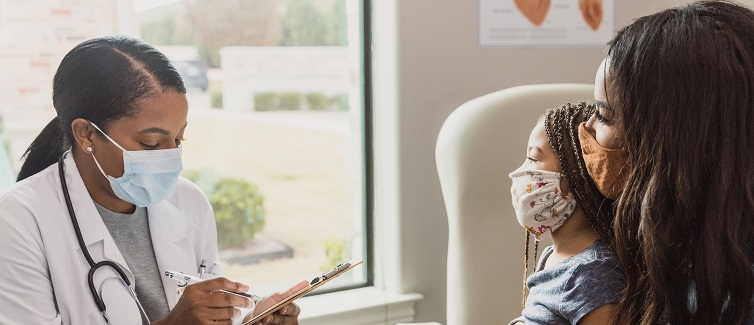It’s estimated that roughly 1 in 2,500 U.S. babies has an inborn error of metabolism.
Some metabolic disorders are identified through newborn screenings done in the hospital nursery. Others are diagnosed later in life when a child experiences a health emergency, misses a developmental milestone, or develops a puzzling symptom.
Parents of a child diagnosed with a rare inborn error of metabolism can find it difficult to find the right care. The Center for Rare Disease Therapy at UPMC Children’s Hospital of Pittsburgh sees more than 200 new patients with rare inborn errors of metabolism each year, and manages care for thousands of patients living with previously diagnosed rare disorders.
The center currently provides specialized treatment for more than 30 rare diseases — and the list is always growing.
A Designated Center of Excellence
UPMC Children’s is one of only 31 centers in the country named a National Organization of Rare Diseases Center of Excellence.
This designation recognizes the cutting-edge work performed by the rare disease experts at the Center for Rare Disease Therapy and connects them with other experts across the country to provide specialized care and disease management standards for children living with rare diseases.
Jerry Vockley, MD, PhD, a medical geneticist and international expert in the treatment and research of inborn errors of metabolism, is the director of the Center for Rare Disease Therapy at Children’s. He leads a multidisciplinary team of specialists that focuses on treating patients diagnosed with certain types of inborn metabolic disorders and related diseases.
“Inborn errors of metabolism are rare genetic disorders in which the body cannot properly perform specific chemical reactions,” says Dr. Vockley. “The disorders are usually caused by defects in specific proteins that help break down or metabolize parts of food.”
Chemicals that are not properly metabolized can build up to toxic levels in the body and cause a wide range of issues. Some inborn errors of metabolism can cause developmental delays, severe medical problems, or even death if they are not controlled.
Never Miss a Beat!
Subscribe to Our HealthBeat Newsletter!
Thank you for subscribing!
You can now select the specific newsletters you'd like to receive.
You are already subscribed.
Subscribe to more newsletters in our email preference center.
Sorry, an error occurred. Please try again later.
Get Healthy Tips Sent to Your Phone!
Fatty Acid Oxidation Deficiencies
UPMC Children’s is the leading U.S. hospital treating fatty acid oxidation deficiencies (FAODs), a group of inborn errors of metabolism caused by a faulty gene. In children with FAODs, an enzyme that helps the body use stored fat for energy is missing or defective. When the body can’t convert fat into energy as it should, levels of fatty acids build up in the heart, liver, and other organs.
Dr. Vockley is one of the nation’s top experts on fatty acid oxidation disorders, and the Center for Rare Disease Therapy at Children’s is the preeminent program in the field, having treated more patients than any other.
“When diagnosed and treated early, kids with FAODs can live normal lives by eating high-carb, low-fat foods and taking supplements,” says Dr. Vockley. “Right now, there’s only one medication available to treat FAODs. We’re actively working to develop new ones.”
Phenylketonuria
Phenylketonuria (PKU), the most common inherited inborn error of metabolism, is usually detected through routine newborn screenings. It is mainly caused by the partial or complete absence of a single enzyme. Early treatment of PKU is critical to avoid serious complications, including intellectual disability and neurologic problems.
Dr. Vockley and his team developed the only FDA-approved treatment for PKU and are currently developing other novel therapies. The PKU Clinic at UPMC Children’s is one of the nation’s largest, managing more than 350 patients with 10 clinical protocols.
“Over the last 10 years, we were a part of every drug trial that has been done for PKU,” says Dr. Vockley. “That has given us visibility at a national level, which has led to us being included as advisors to drug companies in bringing new therapies to trial.”
Pediatric Liver Transplant Surgery
Children with metabolic diseases face lifelong challenges, such as eating bad-tasting medical foods, following strict diets, having periodic metabolic emergencies, and generally living under close medical scrutiny forever.
These challenges are hard enough to manage when children are young, but become much more difficult to manage as they become teens and want more freedom. Children who struggle with a metabolic disorder — and their families — often can benefit from a liver transplant.
For children living with certain metabolic diseases, liver transplants can:
- Prevent the progression of the disease or, in some cases, cure it altogether.
- Ease, or end, restrictive diets.
- Reduce the long-term cost of medical oversight and disease complications.
UPMC Children’s Pediatric Liver Transplant Program has the world’s largest and most successful experience in liver transplantation as a treatment for metabolic disorders.
Through the program, which recently marked 30 years of groundbreaking surgery and research, Children’s surgeons have performed more pediatric liver transplants than any other center in America. The program’s one-year pediatric liver transplant survival rate is 100%, compared to the national average of 96%.
Children’s is also the leading center for pediatric living-donor liver transplantation (LDLT), with Children’s surgeons performing more LDLTs than any other pediatric transplant center in the U.S. In a pediatric LDLT, a matching adult donor gives a small portion of their liver to the child. The donor’s liver regenerates over several months.
“Pediatric LDLTs are quickly becoming preferred because the child doesn’t have to wait as long for a liver,” says Dr. Vockley. “Once the match is made, the transplant can be done sooner, when the child is healthier. The use of adult-to-child LDLTs has helped to diminish waiting list mortality.”
Gene Therapy
Another area where Dr. Vockley is seeing rapid growth is gene therapy.
In gene therapy, the patient receives a healthy copy of a certain gene by IV. This healthy gene goes into the cells and replaces or inactivates a mutated gene or introduces an entirely new gene. Carriers, called vectors, transport these healthy genes into the cells. Children’s has six gene therapy trials ongoing right now.
“With our multidisciplinary team, we’re well-positioned to begin developing a center for gene therapy that will help advance new treatments from clinical trials to approval for use in the fastest time possible,” says Dr. Vockley. “As gene therapy innovations are made, there’s a likelihood that it could replace the need for transplant at some point in the future.”
Plain Communities Translational Medicine Center
The Center for Rare Disease Therapy also has a program serving families in Pennsylvania’s 53 Amish and Mennonite settlements, as well as those in Ohio, New York, and Indiana, and collaborates with other clinics across the state devoted to their care.
Known collectively as the Plain Communities, these populations are unique in that they have specific genetic health risks caused by inherited gene changes passed down from an ancestor.
Because of the small number of ancestors from which these societies originated, a so-called “founder effect” has allowed for the diagnosis of and focused care for conditions that are otherwise considered rare in the general population.
The conditions vary among the many Plain communities, but a better understanding of these conditions has led to early diagnosis and treatment.
“Study of these conditions in the Plain Communities has helped us to understand and accelerate the development of new treatments for use in both the Plain Communities and in the population at large,” says Dr. Vockley. “We focus on the swift translation of research into innovative new therapies that can be delivered through clinical care.”
Support for Families
Perhaps the biggest benefit of this center devoted to “rare care” is that it makes families of children with rare disorders feel a little less alone and a little more hopeful.
“We offer families the experience we have gained from having taken care of many children with these rare conditions,” says Dr. Vockley. “We learn from every patient, and we try to apply what we learn to the next patient.”
For an appointment, consultation, or patient referral, contact the Center for Rare Disease Therapy at UPMC Children’s Hospital of Pittsburgh by phone at 412-692-7273 or email at RareCare@chp.edu.
Editor's Note: This article was originally published on , and was last reviewed on .
About Pediatrics
From nutrition to illnesses, from athletics to school, children will face many challenges growing up. Parents often will make important health care decisions for them. We hope to help guide both of you in that journey. UPMC Children’s Hospital of Pittsburgh is a national leader in pediatric care, ranking consistently on U.S. News & World Report’s Best Children’s Hospitals Honor Roll. We provide expert treatment for pediatric diseases, along well-child visits, urgent care, and more. With locations across Pennsylvania, Maryland, and West Virginia, you can find world-class care close to home. We also work closely with UPMC Magee-Womens Hospital, a national leader in care for newborns and their mothers. Our goal is to provide the best care for your children, from birth to adulthood and beyond. Visit our website to find a doctor near you.

